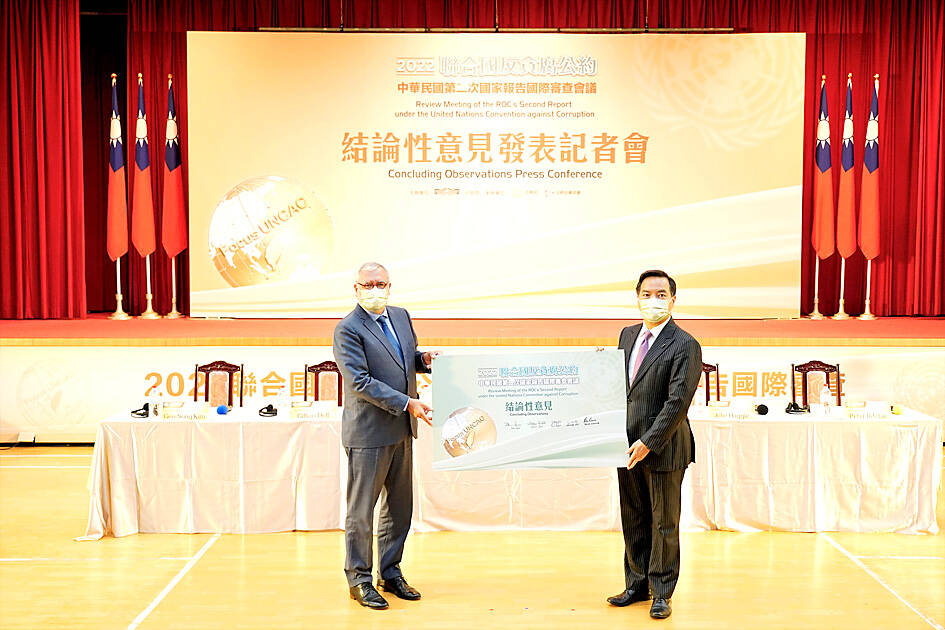International experts on Friday commended Taiwan’s progress on fighting corruption and made more than 100 recommendations, although they said there is room for improvement regarding implementation of the UN Convention Against Corruption.
The international panel for Taiwan’s second report under the convention comprised five experts and was chaired by Peruvian attorney and professor Jose Ugaz during the four-day meeting intended to review Taiwan’s progress in adhering to the UN treaty.
The process began in 2015 when Taiwan adopted the convention in law, despite not being a UN member.

Photo courtesy of the Agency Against Corruption via CNA
Also on the panel was Transparency International head of conventions Gillian Dell; Transparency International New Zealand CEO Julie Haggie; former Transparency International South Korea chair Kim Geo-sung; and Australia’s ABA Rule of Law Initiative regional anti-corruption adviser Peter Ritchie.
The panel conferred with legislators, government officials and judiciary agency delegates, and met with civil society groups and other organizations. They also delivered parallel reports on Taiwan\'s anti-corruption efforts.
Ugaz said that he was in Taiwan in March 2018, when the first report meeting was held to monitor Taiwan’s progress on meeting the convention obligations.
“Taiwan has developed an amazing anti-corruption political will and a unique interaction between government, academia and civil society to confront this phenomenon,” the panel said in its closing statement.
The government “has demonstrated substantial international cooperation against corruption and other crimes,” it said.
However, further progress can be made in partnering with organizations and developing countries by sharing skills and knowledge in areas of money laundering and mutual legal assistance, it added.
Taiwan has implemented “an impressive range of corruption prevention legislation” since the first report, it said.
Taiwan has made legislative amendments to improve procurement transparency and accountability, and bolster regulation of the private sector to improve corporate governance.
The panel also mentioned Taiwan’s money laundering prevention efforts and its limits on government lobbying and political donations.
“We want to congratulate the government of Taiwan for its latest demonstration of its commitment to the anti-corruption cause and express our sincere gratitude for the opportunity to contribute to the review process,” the panel said.
“We are sure this commitment will result in a better and transparent country for the benefit of the people of Taiwan and the generations to come,” it added.
The panel listed some challenges Taiwan faces, including: the need for an independent body to consider requests under the Freedom of Government Information Act (政府資訊公開法); increasing anonymous reporting channels across public and private sectors; and implementing a central register that identifies who controls private entities.
Taiwan could also improve in political donation transparency and setting donation limits, and abolishing offset clauses in future defense acquisition to ensure the integrity of the defense procurement, as the majority of G20 countries have done, it said.

South Korean K-pop girl group Blackpink are to make Kaohsiung the first stop on their Asia tour when they perform at Kaohsiung National Stadium on Oct. 18 and 19, the event organizer said yesterday. The upcoming performances will also make Blackpink the first girl group ever to perform twice at the stadium. It will be the group’s third visit to Taiwan to stage a concert. The last time Blackpink held a concert in the city was in March 2023. Their first concert in Taiwan was on March 3, 2019, at NTSU Arena (Linkou Arena). The group’s 2022-2023 “Born Pink” tour set a

CPBL players, cheerleaders and officials pose at a news conference in Taipei yesterday announcing the upcoming All-Star Game. This year’s CPBL All-Star Weekend is to be held at the Taipei Dome on July 19 and 20.

The Taiwan High Court yesterday upheld a lower court’s decision that ruled in favor of former president Tsai Ing-wen (蔡英文) regarding the legitimacy of her doctoral degree. The issue surrounding Tsai’s academic credentials was raised by former political talk show host Dennis Peng (彭文正) in a Facebook post in June 2019, when Tsai was seeking re-election. Peng has repeatedly accused Tsai of never completing her doctoral dissertation to get a doctoral degree in law from the London School of Economics and Political Science (LSE) in 1984. He subsequently filed a declaratory action charging that

The Hualien Branch of the High Court today sentenced the main suspect in the 2021 fatal derailment of the Taroko Express to 12 years and six months in jail in the second trial of the suspect for his role in Taiwan’s deadliest train crash. Lee Yi-hsiang (李義祥), the driver of a crane truck that fell onto the tracks and which the the Taiwan Railways Administration's (TRA) train crashed into in an accident that killed 49 people and injured 200, was sentenced to seven years and 10 months in the first trial by the Hualien District Court in 2022. Hoa Van Hao, a